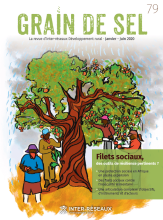Land Library
Welcome to the Land Portal Library. Explore our vast collection of open-access resources (over 74,000) including reports, journal articles, research papers, peer-reviewed publications, legal documents, videos and much more.
/ library resources
Showing items 1 through 9 of 68.The agricultural sector is a cornerstone of Lao PDR’s development strategy, employing over 70 percent of the population. However, agriculture is contributing only 16 percent of the country’s GDP due to factors including low productivity and lack of modernization, among other issues.
Le Cameroun s’est engagé dans un processus de réforme juridique dans les principaux secteurs des ressources naturelles (forêts, mines, terres). Exprimant la position d’un groupe d’organisations et de citoyens intéressés par la gestion de la terre au Cameroun, ce document s’appuie sur les leç
Can historical and political circumstances change the meaning of such a solid and immutable phenomenon as a country’s geographical location? We mean, of course, “change” in terms of a country’s favourable or unfavourable place in the international economic and political system that surrounds it.
The dynamics of current global challenges—like food and nutrition security, environmental degradation, climate change, and emergencies—reduce the availability of and/or access to natural resources, and thereby underline the urgency of achieving transformational changes in the governance of tenure
Land-use planning is an important policy instrument for governing landscapes to achieve multifunctionality in rural areas.
As the United Nations Decade on Biodiversity 2011–2020 comes to a close and countries prepare to adopt a post-2020 global biodiversity framework, this edition of The State of the World’s Forests (SOFO) examines the contributions of forests, and of the people who use and manage them, to the conser
COVID19 a gravement perturbé nos efforts communs visant à soutenir les luttes des utilisateurs locaux des terres et des communautés pour posséder, contrôler et gérer leurs terres et leurs ressources naturelles.
La crise de la Covid-19 est venue confirmer l’importance pour les Etats de disposer d’outils d’aide réactifs en cas de choc (économique, climatique, sanitaire) pour appuyer leur population.Garantir la sécurité alimentaire des ménages, réduire la pauvreté et la vulnérabilité et soutenir le dé









